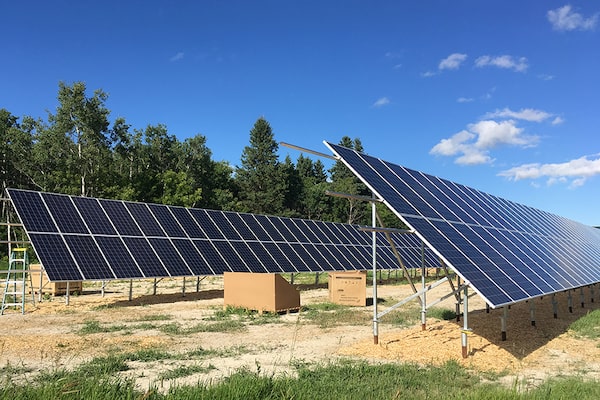
Abe Loewen hadn’t considered putting solar panels on the family’s egg farm in Fisher, Manitoba. Not until his oldest son Dylan broached the topic. Dylan had heard about the benefits of solar at an agricultural conference in Brandon, Manitoba, where he attends university.
“He came home and said, ‘Dad, I really think that we should look at it’,” recalls Loewen, an egg farmer since 1999.
Dylan made the case for several weeks, and his father came on board. A short while later, Loewen installed 600 feet of solar panels a small distance from the barn that houses the farm’s 12,600 hens.
Two years later, Loewen is thrilled with his investment. The panels will be fully paid off in the next 12 years, “and it helps the farm to be environmentally-friendly,” he says.
Loewen is part of a wave of Canadian egg farmers investing in newer ways to produce high-quality eggs, while reducing their footprint on the land. That kind of bold investment is only possible because of Canada’s supply management system, which offers egg farmers a stable wage for their product.
“Egg producers across Canada are innovative people, and we enjoy making the best product we can with the least environmental impact,” says Loewen. “We can only do that if we get a fair price for our eggs.”
The system of supply management is structured so Canadian egg farmers can match their production with consumer demand. End prices are set by the market, but the share received by the farmers remains unchanged.
Today, advancements in agricultural technology are helping egg farmers to employ more productive and sustainable farming techniques. Egg Farmers of Canada (EFC) points to things like the use of big data to track everything from hen health to environmental efficiencies.
In the last 50 years, Canada’s egg industry has reduced its environmental impact by almost half while managing to double its egg production.
Tim Lambert, EFC’s chief executive officer, says the driving force behind greening the egg industry is public trust.
“Canadian consumers want to know that the food they are eating is of the highest quality, but also that the animals are treated well, the environment is respected and the impact is minimal,” says Lambert.
Canadian egg farmers have known for years that there is a direct correlation between public trust and business success, which is why they take a more holistic approach to sustainability.
“This notion of public trust is the most important challenge and opportunity in agriculture,” says Lambert. “I think that commodities and companies that embrace this are going to do well. Those that fear it, avoid it or see it as just an extra cost are going to lose out big time.”
One of the ways to cross the next frontiers in egg farming is through the NSERC/Egg Farmers of Canada Industrial Research Chair in Sustainability. Dr. Nathan Pelletier, who holds the position, says his role is to identify opportunities for Canadian egg farmers to continue to improve resource efficiencies, reduce emissions and keep innovating. That will help keep the egg industry well-positioned as a leader in the agricultural sector.
For Loewen and his family, sustainability is a way of life. Adding the solar panels onto his property was just one more way for him to invest in the future of egg farming.
“It’s a pleasure to produce eggs,” he says. “I love giving customers what they want – and what they want is a more sustainable, quality product.”
Advertising feature produced by Globe Content Studio. The Globe’s editorial department was not involved.